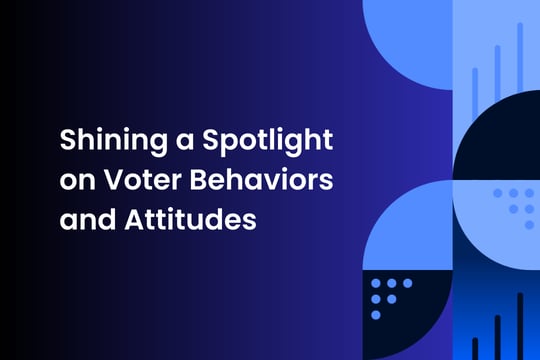New Study: Shining a Spotlight on Voter Behaviors & Attitudes

Today, DISQO is thrilled to share its new Voter Spotlight, which uncovers behaviors & attitudes of United States voters as we enter the 2020 election season. In this report, DISQO shares the results of two distinct studies: a behavioral analysis of how political affiliation affects media consumption and an exploration into voter sentiment, excitement, and motivations.
By leveraging a unique combination of audience profiling, digital behavior data, and attitudinal responses, DISQO was able to achieve two complementary research goals. First, we quantified to what degree political affiliation impacts how people consume various forms of media. Second, we gained a better understanding of voter interests and motivators in 2020.
To assess how voter political affiliation may impact how people spend their time online — particularly with respect to how they seek out news and information — DISQO measured digital behavior in relation to self-reported political affiliation.
To understand voter sentiment and motivators, DISQO asked survey respondents to share:
- Primary participation plans
- Past primary participation behaviors
- Understanding of the primary process
- Why they vote
- Attentiveness to the 2020 Presidential race
- November election participation plans
The twenty-eight page report offers extensive insight into the state of voter attitudes & activity; while some findings were more surprising than others, a few highlights are as follows:
- Non-voters tend to under-index across many categories of media consumption, but most notably so with respect to mainstream media news sites, suggesting a disconnect with the content published on these properties.
- Those registered to a political party followed expected media consumption behaviors, with Republicans over-indexing on FOX News (by 284%) and Democrats over-indexing on MSNBC (by 190%).
- While our media consumption may be heavily influenced by our political perspectives, our motivations for voting are quite similar, with a majority of Democrats (56.4%), Republicans (57.0%), and Independents (52.5%) all expressing that they vote to support policies they believe in.
Methodology
All participants in the study were opted-in members of the DISQO Audience. Digital activity for the behavioral component of the study was captured via a 100% opt-in
first-party data set. Attitudinal responses for the survey component of the study was likewise collected directly from DISQO Audience members.
Behaviors were measured over a 107 day period, from October 1, 2019 through January 15, 2020. Of the 200,000 DISQO Audience members selected for the study, behaviors of 196,294 were assessed in the final analysis, 147,906 of whom are registered voters.
For clarity, active time spent with each site was defined as the total number of seconds a user was on the given website wherein that tab or window of the browser was not in the background. Average total time spent for each cohort was then benchmarked against the group’s norm for each site.
For the attitudinal component of the study, DISQO surveyed 16,080 members of the DISQO Audience. Results were collected over a two day period, from January 7, 2020 through January 8, 2020.

Subscribe now!
Get our new reports, case studies, podcasts, articles and events
